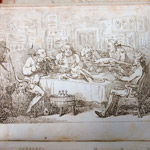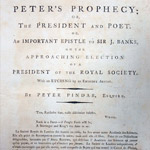 |
 |
'Hell seize the Pack! - unconscionable dogs! - / Snakes, spiders, beetles, chaffers, tadpoles, frogs,/ All swallow'd to display what man can do, / And must the villains still have something new? -/ Tell, then, each pretty President Creator,/ G-d d-mn him, that I'll eat an Alligator.' So wrote Peter Pindar (Dr John Wolcot) in Peter's Prophecy (1788), a satire on Sir Joseph Banks and the Royal Society. Wolcot, one of the most important satirists of the later eighteenth century, also attacked members of the Royal Academy (Benjamin West, Dominic Serres, Johann Zoffany) and the follies and foibles of George III. Of 'Farmer George' he said: 'the king had been a good subject to him, and he a bad one to the king.' |

